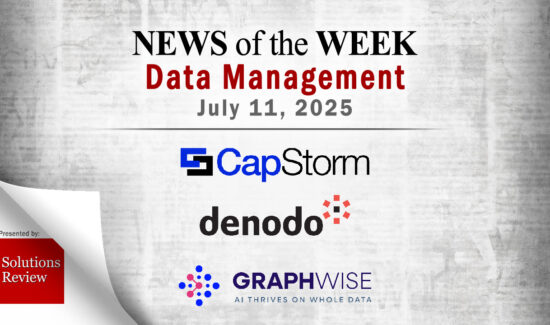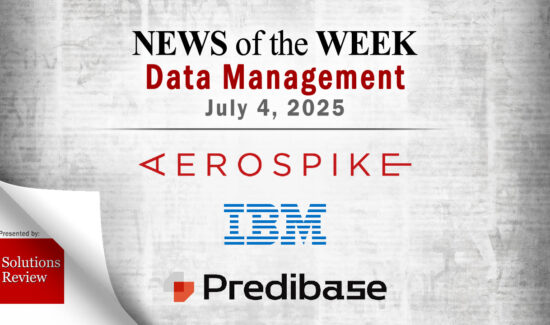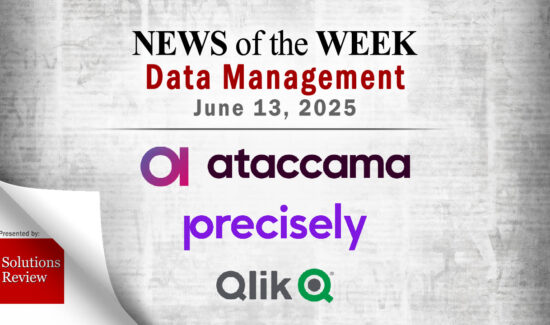2020 KMWorld 100: 16 Data Management Vendors that Matter Most


Source: KMWorld
The editors at Solutions Review have compiled this list of data management vendors that matter most from the recently published 2020 KMWorld 100 listing.
Knowledge management information provider, publisher and conference organizer KMWorld recently unveiled its 2020 KMWorld 100 Companies That Matter in Knowledge Management. The 2020 KMWorld 100 outlines the top knowledge management solution and services providers and is assembled via input from editors, analysts, experts, and product end-users. Inclusion criteria is based on functionality, creativity, product innovation, and a history of demonstrated success with clients.
At Solutions Review, we track the solution providers that have the biggest impact on the mid-market and enterprise, As such, we’ve perused the complete 2020 KMWorld 100 report, available here, and segmented the vendors and tools that matter most in data management.
Amazon Web Services
Amazon Web Services (AWS) offers Amazon Redshift, a fully managed, petabyte-scale data warehouse that analyzes data using an organization’s existing analytic software. Redshift’s data warehouse architecture allows users to automate common administrative tasks associated with provisioning, configuring, and monitoring cloud data warehousing. Backups to Amazon S3 are continuous, incremental and automatic. Redshift also includes Redshift Spectrum, allowing users to directly run SQL queries against large volumes of unstructured data without transforming.
ASG Technologies
ASG Technologies offers a data intelligence platform that can discover data from more than 220 traditional and big data sources. The tool features automated data tagging by pattern matching, integration of reference data, and enriched metrics. Automated business linage allows users to better understand their data, and governance capabilities include those for tracing data in the data lake and traditional sources. ASG’s EDI product offers an impressive capabilities portfolio, with reference customers touting the vendor’s support for a variety of business use cases.
Cambridge Semantics
Trademarked ‘The Smart Data Company’, Cambridge Semantics is a data management and analytics provider that offers a semantic layer to connect enterprise data. The company’s flagship product, the Anzo Smart Data Lake, allows users to link, analyze, and manage enterprise data in a variety of formats including structured, unstructured, internal, and external. The vendor also develops a massively parallel processing graph database called AnzoGraphDB.
IBM
IBM has data management products for virtually every enterprise use case. Its products can be deployed in any environment, and partnerships with some of the other top names in the marketplace make it an even more intriguing option for organizations with large workloads and expansive data jobs. IBM also offers its Informix database that can integrate SQL, NoSQL/JSON, time series and spatial data.
Google offers a fully-managed enterprise data warehouse for analytics via its BigQuery product. The solution is serverless and enables organizations to analyze any data by creating a logical data warehouse over managed, columnar storage, and data from object storage and spreadsheets. BigQuery captures data in real-time using a streaming ingestion feature, and it’s built atop the Google Cloud Platform. The product also provides users the ability to share insights via datasets, queries, spreadsheets and reports.
MarkLogic
MarkLogic offers an operational and transactional enterprise NoSQL database that is designed to integrate, store, manage, and search for data. Organizations can ingest structured and unstructured data with a flexible data model that adapts to changing data. It also natively stores JSON, XML, text, and geospatial data. MarkLogic’s Universal Index enables users to search across all data, and APIs enable application development and deployment. The database has ACID transactions, scalability and elasticity, and certified security as well.
Microsoft
Microsoft offers an array of data management products, including those for analytics, data governance, and even data virtualization. Its SQL Server solution provides data warehousing for both on-prem and cloud deployments, as well as an in-memory database. Microsoft allows organizations to access, store, and analyze any kind of data and even offers fully-managed Hadoop and Spark. The company is one of the major players in the overall big data marketplace, with top-ranked tools in business intelligence and data integration.
Neo4j
Neo4j offers a graph database that helps organizations make sense of their data by revealing how people, processes and systems are related. Neo4j natively stores interconnected data so it’s easier to decipher data. The property graph model also makes it easier for organizations to evolve machine learning and AI models. The platform supports high-performance graph queries on large datasets as well.
Reltio
Reltio Connected Customer 360 is a SaaS platform built on a cloud-native big data architecture. The product features graph technology and machine learning capabilities as well. Users can quickly onboard new data sources, add, change or remove customer profile attributes without downtime, and enable developers to build and launch new products. Reltio can scale up to billions of profiles and can support thousands of users, and remains the only cloud-native MDM solution in the marketplace.
SAS Software
SAS is the largest independent vendor in the data management marketplace. The company’s main product is built atop a data quality platform that allows users to improve, integrate, and govern enterprise data. SAS Data Management can ingest data from legacy systems and Hadoop, and create rules once and reuse them. In addition, users can update data, tweak processes, and analyze results themselves. A built-in business glossary as well as third-party metadata management and lineage visualization capabilities allow for collaboration.
Smartlogic
Semaphore is an enterprise-grade semantic platform that allows organizations to enrich data, extract facts, and harmonize information sources. The product features a model-driven, rule-based approach that enhances the capabilities of existing technologies. Smartlogic allows users to drive self-service delivery as well as move enterprise search from keyword to semantic to find data related to a query. Smartlogic is known for its excellent modeling, metadata transformation and creation capabilities.





















